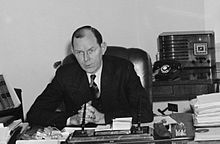James Lawrence Fly
| James Lawrence Fly | |
|---|---|
 |
|
| Chairman of the Federal Communications Commission | |
|
In office September 1, 1939 – November 13, 1944 |
|
| President | Franklin D. Roosevelt |
| Preceded by | Frank R. McNinch |
| Succeeded by | Ewell K. Jett |
| Chairman, Defense Communications Board | |
|
In office September 24, 1940 – November 13, 1944 |
|
| Preceded by | office created |
| Succeeded by | Ewell K. Jett |
| Personal details | |
| Born | February 22, 1898 Dallas County, Texas |
| Died |
January 6, 1966 (aged 67) Daytona Beach, Florida |
| Political party | Democratic |
| Spouse(s) | Mildred Marvin Jones |
| Children | James Lawrence Fly, Jr., and Sara Virginia Fly |
| Alma mater | United States Naval Academy, Harvard Law School |
| Occupation | lawyer |
| Military service | |
| Service/branch | United States Navy |
| Years of service | 1920–1923 |
James Lawrence "Larry" Fly (February 22, 1898 – January 6, 1966) was an American lawyer, famous as chairman of the Federal Communications Commission and, later, director of the American Civil Liberties Union. He helped inaugurate standards for commercial television broadcasting, and vigorously opposed wiretapping throughout his career.
Fly grew up in Texas and graduated from North Dallas High School in 1916. He then graduated from the United States Naval Academy before serving three years in the United States Navy. He resigned to earn a law degree from Harvard Law School. After a short time in private practice, Fly took a position prosecuting antitrust cases for the government. He joined the Tennessee Valley Authority in 1934, rising from solicitor general to general counsel. Fly married Mildred Marvin Jones in 1923, with whom he had two children, James Lawrence, Jr., and Sara Virginia.
When Fly was appointed to replace Frank McNinch as FCC chairman in 1939, commercial television had not yet begun in the U.S. In April of that year, RCA attempted to broadcast commercial content in New York City using standards set by the Radio Manufacturers Association (now the Electronic Industries Alliance), but these broadcasts were unauthorized and experimental. In December 1939 the FCC announced it would authorize limited commercial broadcasts, but it was not clear what standards should be used. By early 1940 RCA made aggressive moves to dominate the industry, and many of their competitors objected. The FCC halted all commercial broadcasts, and insisting that the television industry as a whole develop standards before broadcasting continue. To break this impasse, Fly urged Walter R. G. Baker to found the National Television System Committee, or NTSC, and negotiations were soon reached. This became the model that the FCC has used repeatedly when developing new standards for nascent technologies.
...
Wikipedia
